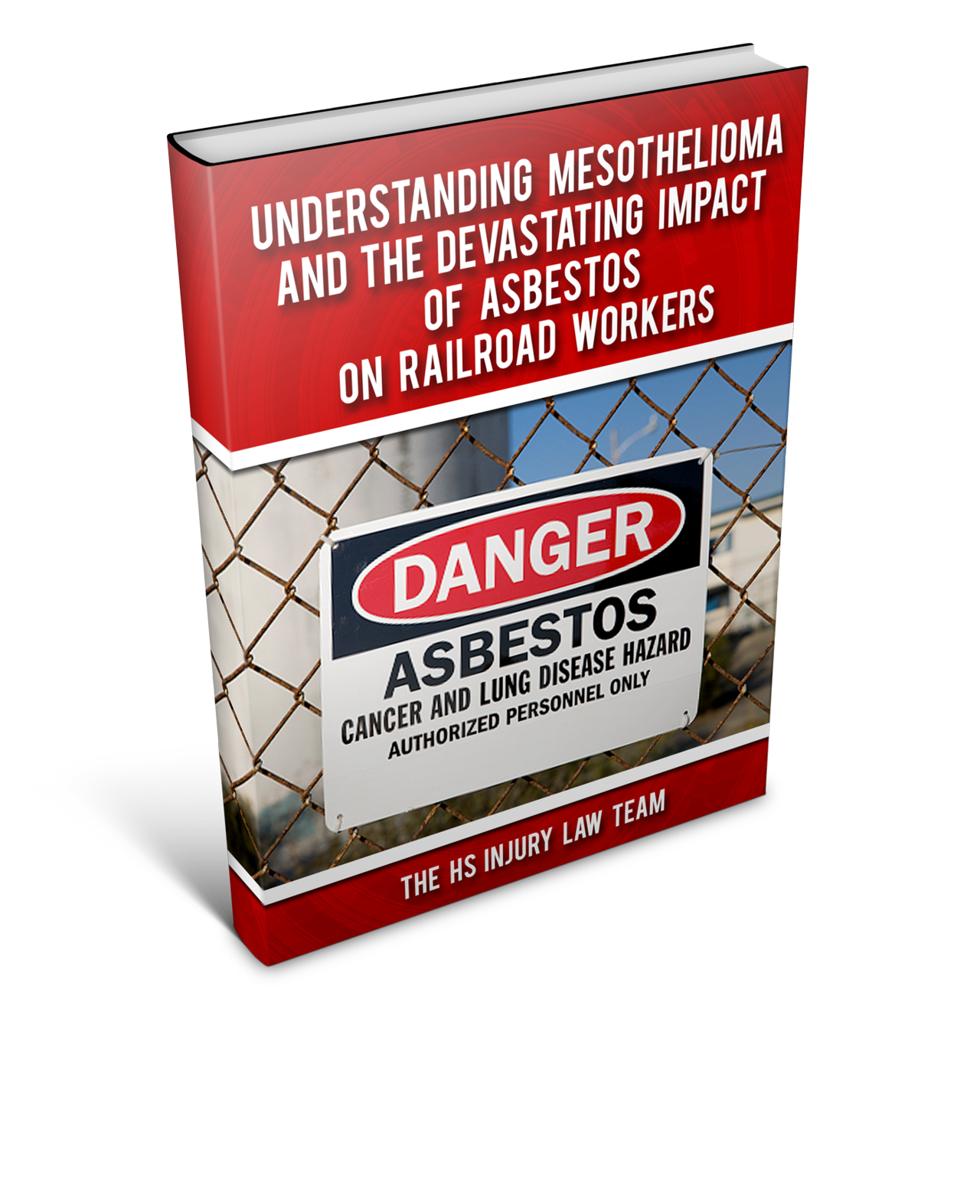General Info about Railroad Asbestos Cancers like Mesothelioma
Lung cancers, asbestosis, or mesothelioma (an incurable form of cancer of the outer lung lining) all can result from exposure to toxic asbestos at railroads, whether in Virginia or elsewhere. Many workers in different fields, but especially railroad workers, may be at risk of developing an asbestos cancer like mesothelioma since some companies failed to take immediate action when the health risks of asbestos came to light. Why are railroad workers at high risk? Because the data points to that risk. For example, from 1990 to 1999, railroad workers were one of the leading industry-recorded deaths from asbestosis.
Firm Guide Focuses on Your Legal Rights Against Your Railroad Employer If You Were Exposed to Asbestos and Later Developed Mesothelioma
 Our team of railroad worker attorneys edited and published an in-depth legal guide exploring the connection between asbestos exposure and mesothelioma. The guide also covers your legal rights under the Federal Employers’ Liability Act (“FELA”). To download the free guide, simply click here and enter your contact info. A guide will be e-mailed to you in PDF format.
Our team of railroad worker attorneys edited and published an in-depth legal guide exploring the connection between asbestos exposure and mesothelioma. The guide also covers your legal rights under the Federal Employers’ Liability Act (“FELA”). To download the free guide, simply click here and enter your contact info. A guide will be e-mailed to you in PDF format.
Asbestos and the Rail Industry
All types of railroad workers, including engineers, conductors, track maintenance workers, carmen, shop workers, etc. may have been exposed to asbestos during their careers.
This is especially true for railroad workers who have been working for a railroad for 20 or 30 years since they may have been exposed to asbestos before the railroad industry begrudgingly took steps to remove asbestos from train cabs and other parts.
For more info about mesothelioma and other railroad-related lung cancers, check out these articles:
- Workers with Mesothelioma and Another Lung Cancer Can File Separate Claims
- Top 3 Things You Must Know When Filing a Mesothelioma Claim
- The Connection between Asbestos and Mesothelioma
Even Second-Hand Asbestos Exposure, or Minimal Exposure, Can Be Deadly
Some workers, whether in the railroad industry or other industries, may be thinking, “I worked around asbestos a lot and never remember seeing dust or breathing in anything bad.” This is understandable since asbestos fibers are minuscule and not noticeable to the naked eye. In fact, individual asbestos fibers are microscopic (many times smaller than a human hair in diameter) and when a person can see asbestos dust in the air, it means that the concentration is actually hundreds or thousands of fibers to become even visible dust.
However, what you may not know is that asbestos fibers can remain airborne for a long period of time. This means that workers who may not have handled asbestos products directly could have been exposed and, therefore, may be at risk of developing an asbestos cancer like mesothelioma or asbestosis.
I Was a Smoker. Does that Affect My Potential Asbestos Cancer/Mesothelioma Claim?
Not necessarily. Many of our former clients were very concerned about whether they could bring a railroad asbestos cancer case if they were cigarette smokers during their lifetime. We have accepted many cases where railroad workers smoked. Your smoking history does not preclude a claim since the railroads failed to warn workers that smoking increased your risk of contracting lung cancer 80 times higher than non-smokers. Occupational doctors were well aware of what is called the “synergistic effect” between cigarettes and asbestos exposure.
What to Do Next
If you or a loved one was diagnosed with mesothelioma or another cancer, and suspect asbestos exposure contributed to the diagnosis, consider speaking with an attorney to discuss your legal options. You may be able to obtain financial compensation from the employer who subjected you to asbestos exposure.
Experience Matters in this Area of Law
Many corporations, especially large railroad corporations like Norfolk Southern, CSX, Burlington Northern, Conrail, Amtrak, and others, fight asbestos cancer cases tooth and nail. Many corporate defense lawyers try to argue that the connection between your asbestos exposure and time at work was too “speculative” and will try to find any other period in your life that you may have been exposed to asbestos. Or, they will argue that some other external factor led to your cancer diagnosis.
How Our Virginia Beach and Norfolk Railroad Mesothelioma Law Firm Is Different
We know that mesothelioma has only been linked with prior asbestos exposure. There is no other known cause of mesothelioma, aside from previous exposure to asbestos fibers. Therefore, when a railroad defense lawyer claims that you had no such exposure, our team of experienced railroad injury lawyers (licensed in both VA and NC) can fight against that argument. Our team will work to rule out any other obvious sources of potential asbestos exposure and highlight the fact that the railroad industry was known to have used asbestos for insulating materials all over engines and even its yard offices. An investigation must be carefully conducted and we have the team to do that.

Connect with me
Personal Injury & Wrongful Death Lawyer Serving Va Beach, Norfolk, Chesapeake & all of Virginia